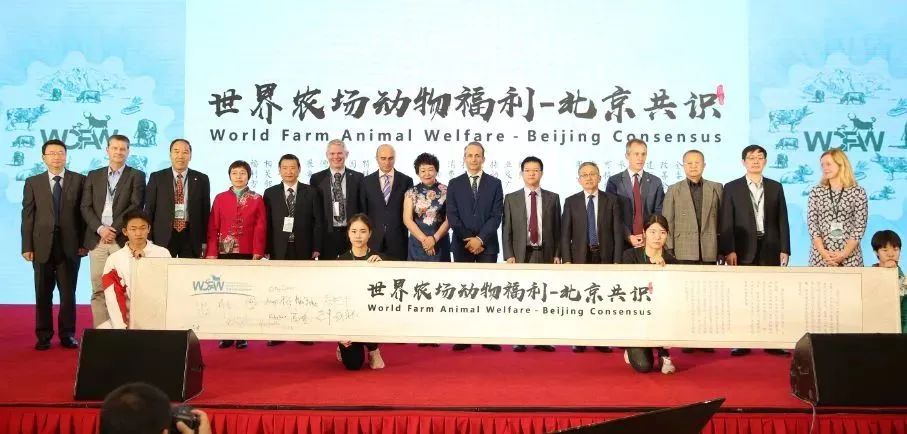一、促进会的会员由团体会员和个人会员组成。
二、申请加入本会的会员须具备如下条件:
1. 拥护本团体的章程;
2. 有加入本团体的意愿;
3. 在本团体的业务(行业、学科)领域内具有一定的影响;
4. 有良好的诚信、契约与合作精神;
5. 愿意为产业的健康发展贡献力量,并承担更多社会任。
三、会员入会的程序是:
1. 提交入会申请书;
2. 经理事会讨论通过;
3. 理事会闭会期间,经常务理事会讨论通过;
4. 由理事会或理事会授权机构发给会员证。
四、会员享有下列权利:
1. 本团体的选举权、被选举权和表决权;
2. 参加本团体的活动;
3. 获得本团体服务的优先权;
4. 对本团体工作的批评建议权和监督权;
5. 入会自愿,退会自由。
五、会员履行下列义务:
1. 遵守本团体的决议;
2. 维护本团体的合法权益;
3. 完成本团体交办的工作;
4. 按规定交纳会费;
5. 向本团体反映情况,提供有关资料。
六、会员退会应书面通知本团体,并交回会员证。会员如1年不交纳会费或不参加本会活动的,视为自动退会。
七、会员如有严重违反本章程的行为,经理事会或常务理事会表决通过,予以除名。
八、个人会员仅限本会邀请。

Animal husbandry plays an active role in promoting global food security and nutrition and improving the economic, social and environmental sustainability of the food system. Farm animal welfare advocates for scientific, safe, humane and environmentally-friendly production methods. It is an important approach to realize the green development of animal husbandry and safeguard human food security. The international community should reach a consensus and take concerted actions to strengthen international cooperation and communication, and rebuild a sustainable, responsible and efficient future for animal husbandry. Therefore, the representatives of various organisations jointly launch the initiative in Beijing, China on October 24th 2018 and reach the following consensus:
畜牧业在促进全球粮食安全与营养,提高粮食系统经济、社会与环境可持续性方面具有积极作用。农场动物福利倡导科学、安全、人道、环境友好的生产方式,是实现畜牧业绿色发展、保障人类食品安全的重要手段。国际社会应达成广泛共识,采取一致行动,加强国际合作与交流,重塑可持续、负责任、高效率的畜牧业未来。为此,各方代表于2018年10月24日在中国北京共同发起倡议,达成以下共识:
Firstly, we support FAO’s Committee on World Food Security (CFS) in its recommendations on improving global farm animal welfare in its 43rd Session. We support the Five Freedoms and animal welfare standards advocated by OIE. We acknowledge the important role of animal welfare in promoting sustainable agricultural development, food security and nutrition, etc.
一、支持FAO世界粮食安全委员会第43届会议关于改善全球农场动物福利的建议;支持OIE倡导的五项自由原则及动物福利标准;承认动物福利在支持农业可持续发展、推动粮食安全和营养等方面的重要作用。
Secondly, we advocate that government agencies, international organisations, scientific research institutes, producers and consumers should care for and support animal welfare, and facilitate the wide-spread promotion of animal welfare in the international community. Through the establishment of safe and healthy consumption concepts as well as green and sustainable production and lifestyle, we can promote the healthy development of global animal husbandry.
二、倡导政府机构、国际组织、科研院所、生产企业及广大消费者关注和支持动物福利,促进动物福利在国际社会中的传播与推广。树立安全、健康的消费理念,选择绿色、可持续的生产生活方式,促进全球畜牧业健康发展。
Thirdly, we respect the specific circumstances of different countries, and support each country in its exploration of farm animal welfare-friendly production models that fit with the national circumstances in terms of animal husbandry characteristics, resources and consumers’ demands and adhere to the requirements of sustainable animal husbandry development so that farm animals can bring more benefits to human development. We encourage the relevant departments in their technology development and application in improving farm animal welfare.
三、尊重世界各国的国情特殊性,支持各国根据本国畜牧业发展特点与消费者需求,探索符合本国资源条件与畜牧业可持续发展要求的农场动物福利养殖模式,让农场动物更好地为人类发展造福。鼓励相关部门在改善农场动物福利方面的技术开发与应用。
The parties agree to work together to realise the objectives above by supporting the following approaches:
各方同意通过支持以下工作共同努力实现上述目标:
1. Build knowledge based on sound scientific evidence
Strengthen scientific research into the needs of farm animal species and the impacts on animals of different environments, systems and practices.
基于可靠的科学证据建立知识体系加强对农场动物不同物种需求的科学研究以及不同环境、系统和实践对动物的影响。
2. Implement gains from scientific research
Ensure that where possible the results of scientific research to explore animal welfare are shared with producers and that stakeholders work together to improve the entire life experience of animals, with consideration for every stage from birth to rearing, transport and slaughter.
运用科学研究所得成果确保在任何可能的情况下,与生产者分享探索动物福利的科学研究成果,各相关方共同努力,对动物从出生到饲养、运输和屠宰的每个阶段进行考虑,改善其整个生命体验。
3. Raise consumer awareness
Increase public understanding of ‘One Welfare’ – the interconnectedness of the welfare of animals, human wellbeing and the quality of the natural environment – and promote dialogue between government, industry, civil society and the public to maximise society’s understanding of these links.
提高消费者意识提高公众对“同一福利”的理解 ,即动物福利、人类康乐以及自然环境质量间的相互关联。 促进政府、行业、民间团体和公众之间的交流,最大限度地提高社会对这些相关联系的理解。
4. Share information through stakeholder platforms
Utilise existing platforms and establish new fora that bring together government departments at all levels, veterinarians, academics/researchers, major producers, small/medium-scale farmers, food retailers and other stakeholders, to strengthen mutual exchange and openness around the practical experience, research outcomes and relevant materials gained by each region or field in farm animal welfare.
通过相关方平台共享信息利用现有平台并创建新的论坛,汇集各级政府部门、兽医、学者/研究人员、主要生产者、中小农户、食品零售商和其它相关方,以加强相互交流和提高各地区或各领域在农场动物福利方面的实践经验、研究成果和相关材料的公开程度。
5. Increase capacity building
Strengthen the farm animal welfare capacity of practitioners in all fields of livestock husbandry – on farm, during transport and at slaughter – through sharing of best practice and delivery of training.
加强能力建设通过分享最好的实践经验和培训,提高畜牧业的农场、运输和屠宰等各个环节从业人员在农场动物福利方面的能力。
6. Promote policy support
Seek ways to encourage and incentivise producers to improve farm animal welfare and adopt efficient livestock practices, where appropriate through economic and agriculture policy. Recognise and reward good animal welfare practice and integrate animal welfare into food supply systems alongside food security, safety and quality.
推动政策支持寻求鼓励和激励生产者改善农场动物福利的方法,并酌情通过经济和农业政策鼓励高效养殖的实践。对良好的动物福利实践进行认可和奖励,并将动物福利与食品保障、安全和质量相结合共同纳入粮食供应系统中。
7. Promote legislation and enforcement
Promote the enactment and implementation of animal welfare laws and regulations, strengthen enforcement and refine enforcement methods. Promote the enforcement of relevant OIE and FAO standards and guidelines through training and other cooperation.
促进立法和执法推动动物福利法律法规的制定和实施。加强执法、改善执法方法。 通过培训和其它合作方法促进OIE和FAO相关标准和指南的实施。
8. Improve standards, traceability and labelling
In the long term establish higher animal welfare standards with reliable systems of farm monitoring and auditing, traceability and food labelling to ensure consumer trust and confidence in the claims of producers and retailers.
改进标准、可追溯和标签体系从长远来看,建立更高的动物福利标准的同时要拥有可靠的农场监测和审核系统、可追溯和食品标签体系,以确保消费者对生产者和零售商所宣称内容的信任和信心。
Representatives of the Joint Initiators:
Food and Agriculture Organization of the United Nations (FAO)
The Royal Society for the Prevention of Cruelty to Animals (RSPCA)
Compassion in World Farming (CIWF)
World Animal Protection
The Donkey Sanctuary
World Horse Welfare
China Animal Agriculture Association
China Meat Association
Beijing Feed Industry Association
Inner Mongolia Acadamy of Agricultural & Animal Husbandry Sciences
Anhui Academy of Agricultural Sciences
Nanjing Agricultural University
Inner Mongolia Agricultural University
Wageningen University & Research
Jeanne Marchig International Centre for Animal Welfare Education, The Royal (Dick) School of Veterinary Studies, The University of Edinburgh
China Association for the Promotion of International Agricultural Cooperation (CAPIAC)
倡议共同发起代表:
1.联合国粮食及农业组织
2.英国皇家防止虐待动物协会
3.世界农场动物福利协会
4.世界动物保护协会
5.英国驴慈善协会
6.世界马福利协会
7.中国畜牧业协会
8.中国肉类协会
9.北京市饲料工业协会
10.内蒙古农牧业科学院
11.安徽省农业科学院
12.南京农业大学
13.内蒙古农业大学
14.荷兰瓦赫宁根研究院
15.爱丁堡大学皇家迪克兽医学院珍妮·玛琪格动物福利国际教育中心
16.中国农业国际合作促进会
Address:Room 413, Institute of Quality Standard and Testing Technology for Agro-products of CAAS, No.12 Zhongguancun South Street, Haidian District, Beijing.
Tel:010-82106320 Emil:capiac@capiac.org.cn Website: www.capiac.org.cn
©2022 China Association for the Promotion of Internation 京ICP备19036789号-2
Support:OMOOO
